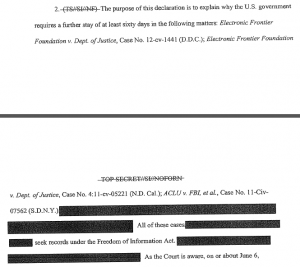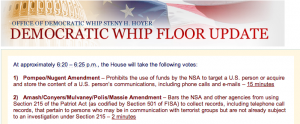The former NSA IG (and current affiliate of the Chertoff Group profiteers, though he didn’t disclose that financial interest) Joel Brenner has taken to the pages of Lawfare to suggest anyone trying to force some truth out of top Intelligence Community officials is dishonorable.
On March 12 of this year, Senator Ron Wyden asked James Clapper, the director of national intelligence, whether the National Security Agency gathers “any type of data at all on millions or hundreds of millions of Americans.”
“No, sir,” replied the director, visibly annoyed. “Not wittingly.”
Wyden is a member of the Senate Select Committee on Intelligence and had long known about the court-approved metadata program that has since become public knowledge. He knew Clapper’s answer was incorrect. But Wyden, like Clapper, was also under an oath not to divulge the story. In posing this question, he knew Clapper would have to breach his oath of secrecy, lie, prevaricate, or decline to reply except in executive session—a tactic that would implicitly have divulged the secret. The committee chairman, Senator Diane Feinstein, may have known what Wyden had in mind. In opening the hearing she reminded senators it would be followed by a closed session and said, “I’ll ask that members refrain from asking questions here that have classified answers.” Not dissuaded, Wyden sandbagged he [sic] director.
This was a vicious tactic, regardless of what you think of the later Snowden disclosures. Wyden learned nothing, the public learned nothing, and an honest and unusually forthright public servant has had his credibility trashed.
Brenner of course doesn’t mention that Clapper had had warning of this question, so should have provided a better non-answer. Later in his post, he understates how revealing telephone metadata can be (and of course doesn’t mention it can also include location). He even misstates how often the phone metadata collection has been queried (it was queried on 300 selectors, not “accessed only 300 times”).
But the really hackish part of his argument is in pretending this whole exchange started on March 12.
It didn’t. It started over a year ago and continued through last week when Keith Alexander had to withdraw a “fact sheet” purporting to lay out the “Section 702 protections” Americans enjoy (see below for links to these exchanges).
The exchange didn’t start out very well, with two Inspectors General working to ensure that Wyden and Mark Udall would not get their unclassified non-answer about how many Americans are surveilled under Section 702’s back door until after the Intelligence Committee marked up the bill.
But perhaps the signature exchange was this October 10, 2012 Wyden letter (with 3 other Senators) to Keith Alexander and Alexander’s November 5, 2012 response.
On July 27, 2012, Alexander put on a jeans-and-t-shirt costume and went to DefCon to suck up to hackers. After giving a schmaltzy speech including lines like, “we can protect the networks and have civil liberties and privacy,” DefCon founder Jeff Moss asked Alexander about recent Bill Binney allegations that the NSA was collecting communications of all Americans. Wired reported the exchange here.
It was this exchange — Keith Alexander’s choice to make unclassified statements to a bunch of hackers he was trying to suck up to — that underlies Wyden’s question. And Wyden explicitly invoked Alexander’s comments in his March 12 question to Clapper.
In Wyden’s letter, he quoted this, from Alexander.
We may, incidentally, in targeting a bad guy hit on somebody from a good guy, because there’s a discussion there. We have requirements from the FISA Court and the Attorney General to minimize that, which means nobody else can see it unless there’s a crime that’s been committed.
Wyden then noted,
We believe that this statement incorrectly characterized the minimization requirements that apply to the NSA’s FISA Amendments Act collection, and portrays privacy protections for Americans’ communications as being stronger than they actually are.
This is almost precisely the exchange that occurred last week, when Wyden and Udall had to correct Alexander’s public lies about Section 702 protections again. 8 months later and Alexander is reverting to the same lies about protections for US Persons.
In the letter, Wyden quoted from Alexander again,
You also stated, in response to the same question, that “…the story that we have millions or hundreds of millions of dossiers on people is absolutely false. We are not entirely clear what the term “dossier” means in this context, so we would appreciate it if you would clarify this remark.
And asked,
Are you certain that the number of American communications collected is not “millions or hundreds of millions”? If so, then clearly you must have some ability to estimate the scale of this number, at least some range in which you believe it falls. If this is the case, how large could this number possibly be? How small could it possibly be?
Does the NSA collect any type of data at all on “millions or hundreds of millions of Americans”?
This last question was precisely the question Wyden asked Clapper 5 months later on March 12 (Alexander’s response in November didn’t even acknowledge this question — he just blew it off entirely).
As Wyden emphasized, Alexander is the one who chose to make misleading assertions in unclassified form, opening up the door for demands for an unclassified response.
Since you made your remarks in an unclassified forum, we would appreciate an unclassified response to these questions, so that your remarks can be properly understood by Congress and the public, and not interpreted in a misleading way.
In other words, Brenner presents the context of Wyden’s question to Clapper completely wrong. He pretends this exchange was about one cleared person setting up another cleared person to answer a question. But Brenner ignores (Wyden’s clear invocation of it notwithstanding) that this exchange started when a cleared person, General Alexander, chose to lie to the public.
And now that we’ve seen the minimization standards, we know just how egregious a lie Alexander told to the hackers at DefCon. It’s bad enough that Alexander didn’t admit that anything that might possibly have a foreign intelligence purpose could be kept and, potentially, disseminated, a fact that would affect all Americans’ communications.
But Alexander was talking to high level hackers, probably the group of civilians who encrypt their online communications more than any other.
And Alexander knows that the NSA keeps encrypted communications indefinitely, and with his say-so, can keep them even if they’re known to be entirely domestic communications.
In other words, in speaking to the group of American civilians whose communications probably get the least protections from NSA (aside from the encryption they themselves give it), Alexander suggested their communications would only be captured if they were talking to bad guys. But the NSA defines “those who encrypt their communications” as bad guys by default.
He was trying to suck up to the hackers, even as he lied about the degree to which NSA defines most of them as bad guys.
Brenner gets all upset about his colleagues being “forced” to lie in public. But that’s not what’s going on here: James Clapper and, especially, Keith Alexander are choosing to lie to the public.
And if it is vicious for an intelligence overseer to call IC officials on willful lies to the public, then we’ve got a very basic problem with democracy. Read more →



